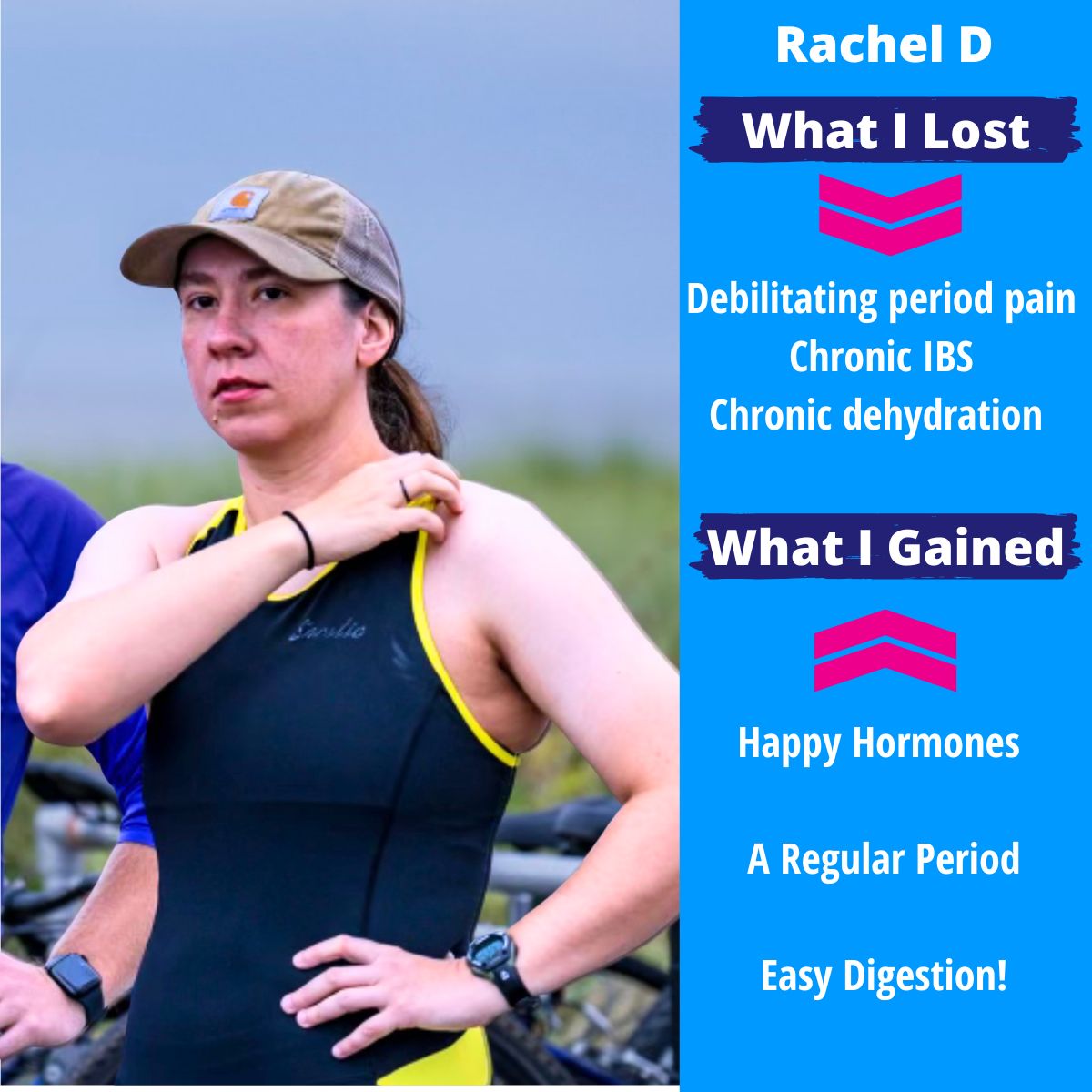.png)
.png)

Have you wondered what happens when a lifetime athlete dates a nutrition coach? I’m guessing you haven’t wondered that but stick around because I’m going to tell you all about how Rachel changed her hormonal health through diet and lifestyle. Heads up, this next part is where I brag about my girlfriend.
Rachel didn’t make these changes because we were trying to help her body rebalance, she made the changes because we were experiencing life together and adopting many of my habits worked for her. Also, I do most of the cooking.
Rachel was excited to share her story in the hopes of offering hope to help other people know they can heal from IBS (irritable bowel syndrome) and for women to know that endometriosis doesn’t have to mean a lifetime of suffering.
My incredible girlfriend, Rachel, struggled from her childhood until recently with IBS and debilitating endometriosis. It took years and years to receive an accurate endometriosis diagnosis, after first being “diagnosed” in MIDDLE SCHOOL (12 yrs) with “wimpy girl syndrome." Let me repeat that, a medical professional looked Rachel and her mother in the eye and not only denied her experience and pain, but implied she was too sensitive. This enrages me to no end. This is also, unfortunately, an all too common experience for women and girls seeking help from the medical field.
Rachel was an athlete her whole life and went to university as a D1 javelin thrower. Moving her body, building strength, and technique are as much a part of her as anything else. However, she received little guidance around how to care for her body regarding her athletics or hormonal health.
Arriving in 2024, Rachel and I barely made it past the first few hangouts because her IBS was raging and she’s too uncomfortable to relax and be herself. At this time, I was mistakenly thinking that Rachel and I had little rapport or chemistry.
Fast forward, we learned we had a ton of chemistry and I learned that Rachel’s body was screaming for care from her active symptoms. We couldn’t get enough of each other and started doing much of life with one another. Simply because we were sharing meals and a lifestyle, Rachel’s processed food intake dropped by 50%. Whole foods, protein, vegetables, fruit, probiotic foods, and dietary variety become the norm instead of the exception. She both started to eat regularly and use hormonally informed time-restricted feeding. She started regularly having raspberry, nettle, and peppermint tea which supplied her body with iron and helped relax and tone her uterus and she increased her water intake to an average of 60 ounces daily. She increased her NEAT movement, delayed her coffee an hour after waking, and ditched endocrine-disruptors in her hygiene products.. All these changes resulted in her menstrual pain going from an 8-10, to a 1-3 on a 1-10 scale. Her chronic breast tenderness almost completely disappeared, she is no longer waking up with daily headaches and her bowel movements are in a healthy place regularly for the first time in her life. In short, she’s no longer planning her life around her symptoms.
The last piece of Rachel’s story I want to share was that she went to see Brian Corlett, a chiropractor who does residual strain therapy, a form of body work that works with fascia strain. Rachel was having some discomfort in her hip, knee and ankle, much of which is better now after 6 weeks of regular treatment. Dr. Corlett explained her discomfort was stemming from her endometriosis. Because fascia connects the whole body, one imbalance lead to a ripple effect of more. Fortunately residual strain therapy dramatically helped reduce discomfort and symptoms.
From the outside looking in, the ways her negative symptoms impacted her were not obvious, but they affected her lived experience.
Far too often I hear people speaking about chronic discomfort that they believe they “just have to live with.”
People in their 30’s, 40’s, 50’s, are self-describing as “old” because of this pain or that. This is a narrative that is rarely immovable. Diet, lifestyle choices, and various types of therapies can usually help tremendously, if not assist one in healing completely.
Rachel’s workouts feel better at the gym now, she’s biking regularly, and no longer has to worry about her kidney health as a result of trying to manage period pain with medication. This is where Rachel is after a year of making big and little dietary and lifestyle shifts. Together, we’re going to continue exploring ways to help her body heal and reduce symptoms of endometriosis. My hope is that she can soon join me in the symptom free period club.
We’re looking for members, if you have any PMS symptoms, let’s chat and see what we can do to help you have a symptom free period. Already clients have described having a regular period for the first time in their lives, no longer having stomach pain after each meal, significantly reducing cramping, and gaining more stable mood all month long.